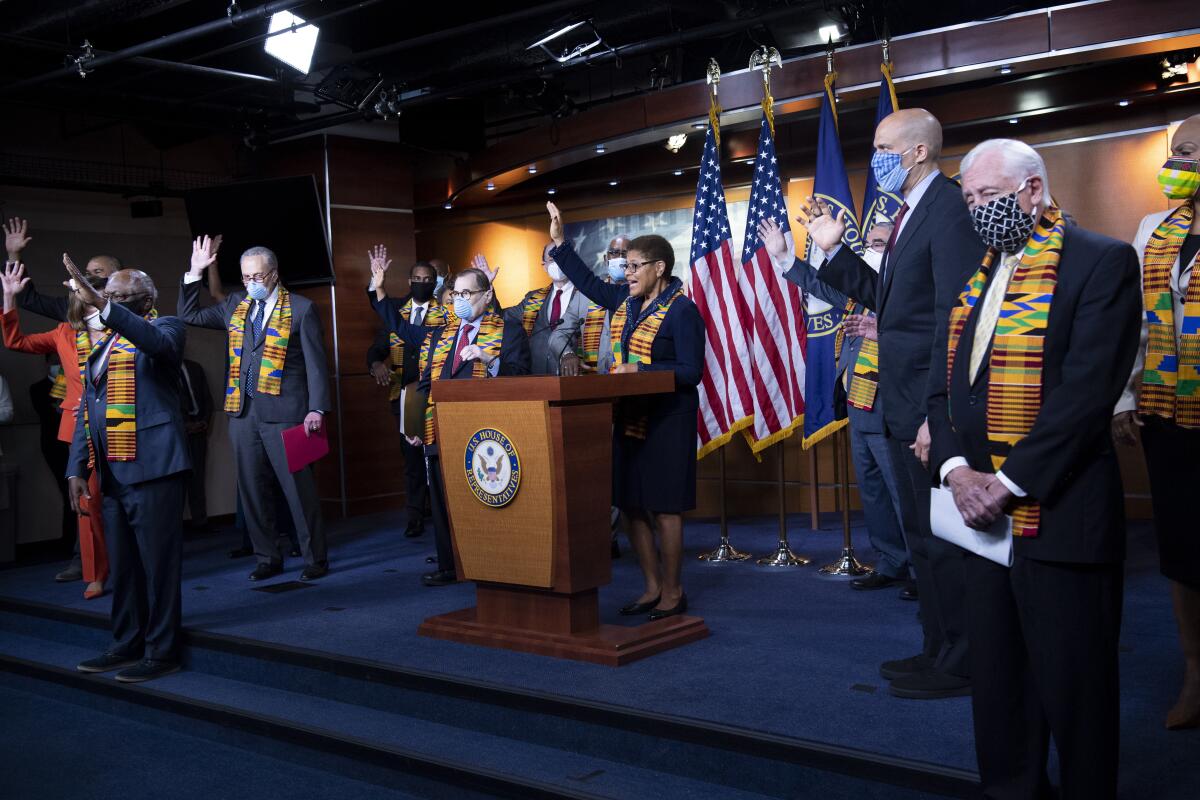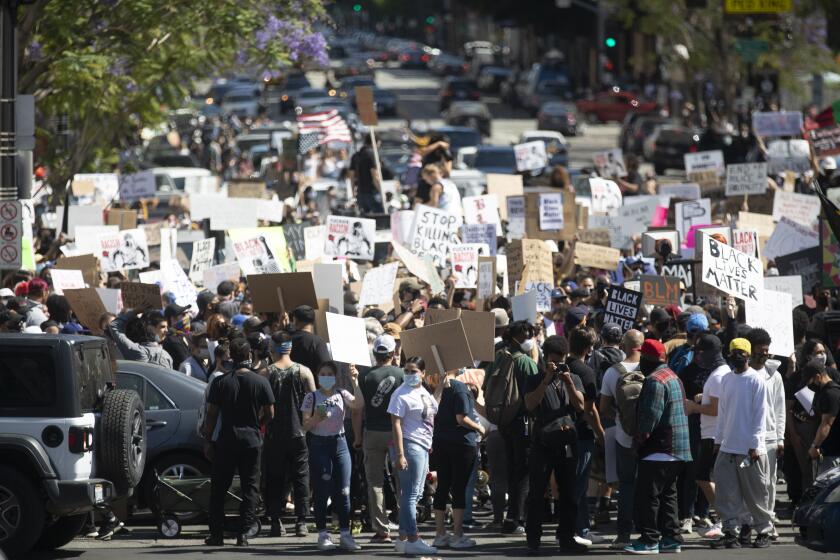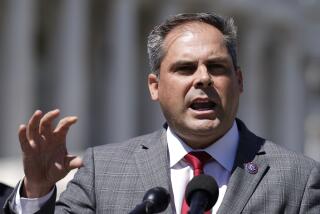Democrats’ police reform bill would ban chokeholds, make civil suits against officers easier

- Share via
WASHINGTON — House Democrats on Monday unveiled a legislative blueprint for reforming policing policies, responding to the nationwide protests calling for change after the death of George Floyd.
The bill, led by Congressional Black Caucus Chairwoman Karen Bass (D-Los Angeles) and Sen. Kamala Harris (D-Calif.), includes reforms making it easier to sue police officers for misconduct in civil court and to prosecute them for criminal behavior.
It would also prohibit the use of chokeholds and certain no-knock warrants by police nationwide, and give the Justice Department civil rights division subpoena power to investigate local police departments.
The bill also mandates the use of body cameras, bans the transfer of certain military equipment to police departments, creates a national database disclosing the names of officers with a pattern of abuse, and would eliminate the legal shield protecting police from lawsuits.
“Never again should the world be subjected to witnessing what we saw on the streets in Minneapolis,” Bass said of Floyd’s death in police custody.
Video showed the white officer, Derek Chauvin, with his knee on Floyd’s neck for nearly nine minutes as the unarmed black man was handcuffed and pleading that he could not breathe. The four officers involved in Floyd’s arrest were fired and now face charges in his death.
In the two weeks since, hundreds of thousands of Americans in all 50 states have protested and demonstrated demanding change.
An estimated 20,000 people converged on Hollywood for a march and demonstration Sunday over police brutality and the death of George Floyd.
Before unveiling the police reform bill at a news conference, House and Senate Democrats met in the Capitol’s Emancipation Hall for 8 minutes and 46 seconds of silence.
“Empathy and sympathy and words of caring for those who have died and suffered are necessary. But it is not enough,” Sen. Cory Booker (D-N.J.) said at the news conference. “We must change laws and systems of accountability. We must pass legislation that makes our common values and our common ideals real in the law of our land.”
The bill would also make lynching a federal crime, something that has broad support in both chambers, but was blocked by Sen. Rand Paul (R-Ky.) last week.
Without significant support from Senate Republicans, who control that chamber, any legislation passed by House Democrats is unlikely to reach President Trump’s desk. Senate Majority Leader Mitch McConnell (R-Ky.) declined to comment on the bill Monday.
Senate Minority Leader Charles E. Schumer (D-N.Y.) said Democrats weren’t going to let the issue fade away.
“In the Senate, Democrats are going to fight like hell to make this a reality,” Schumer said. “Now we must collectively, all Americans, raise our voices and call on Leader McConnell to put this reform bill on the floor of the Senate before July to be debated and voted on.”
Bass said the national protests, and the extremely high level of support for them in national polls, gave Democrats confidence that legislation could pass at this time.
House Minority Leader Kevin McCarthy (R-Bakersfield) said he couldn’t comment on the House proposal because he hasn’t seen it yet, but he identified three possible points of common ground with Democrats: raising the level of officer training by linking training standards to federal money, requiring more transparency about misconduct allegations so police officers can’t escape past problems by moving to another city, and making it easier to remove bad officers.
“I want to work and see that we get law. This is a moment in time,” McCarthy said. “This is the moment where we ought to find where we can come together on.”
Not included in the bill is any nod toward the idea of “defunding the police” or reallocating police budgets toward other social services such as housing and mental health or substance abuse treatment, which some activists began calling for over the weekend.
Decisions about department funding levels are left at the state and local levels. In Minneapolis, where Floyd died, a majority of the City Council announced Sunday their intent to dismantle the current Minneapolis Police Department in favor of “a vision for community-based public safety.”
“I can’t imagine that [kind of funding decision] happening in a federal way,” Bass said, “but let me just tell you that part of that cry is a desire for there to be significant higher investment in communities, looking at why police are needed, what happens, what are the root causes of the problems in communities.”
House Speaker Nancy Pelosi (D-San Francisco) said there might be legislation in the future focused on “rebalancing” funding to address systemic disparities.
Republicans seized on the “defund the police” messaging Monday.
“LAW & ORDER, NOT DEFUND AND ABOLISH THE POLICE. The Radical Left Democrats have gone Crazy!” Trump said in a tweet shortly before the news conference.
A few Republican senators facing reelection in November also spoke out.
“Defunding the police is an absurd and radical position, and I’m concerned that my opponent has been silent while liberals across the country are calling to disband police forces,” Sen. Joni Ernst (R-Iowa) said in a tweet.
“We must fully fund the police. Defunding police departments will result in more violence, more chaos, and more injustice. Police brutality has to end — but by ending brutality, not the police,” Sen. Kelly Loeffler (R-Ga.) said in a tweet.
House Democratic leaders urged their colleagues to stay focused on the broader reform bill and not let it be overshadowed.
Rep. Lisa Blunt Rochester (D-Del.) dismissed Republicans as the “masters of distraction” and said Democrats were focused on the broad, systematic reforms included in the bill.
“We are keeping our eyes on the prize,” she said.
More to Read
Sign up for Essential California
The most important California stories and recommendations in your inbox every morning.
You may occasionally receive promotional content from the Los Angeles Times.












